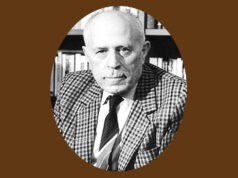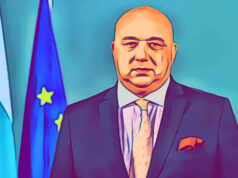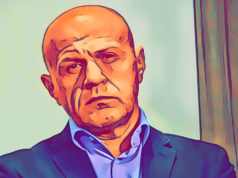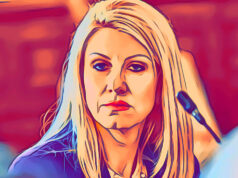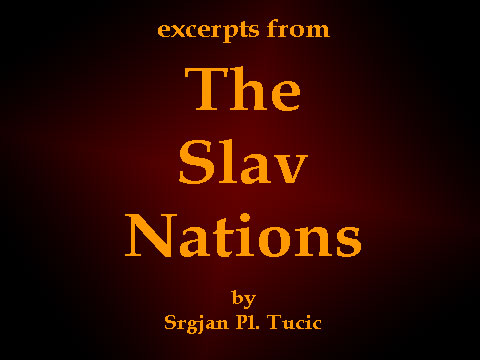 The following is an excerpt from The Slav Nations, by Srgjan Pl. Tucic, a Serbian author writing for an English audience in the early months of the First World War. The Slav Nations was a volume in the Daily Telegraph War Books series.
The following is an excerpt from The Slav Nations, by Srgjan Pl. Tucic, a Serbian author writing for an English audience in the early months of the First World War. The Slav Nations was a volume in the Daily Telegraph War Books series.
Although it is asserted on historical grounds that the Bulgarians are a mixed race, and merely “Slavicized” by the influence of neighbouring Slav races, they certainly ought to be included in the great Slav family. In many ways they have always held aloof from the Slav Ideal, and emphatically preferred to stand alone, but, nevertheless, they have done great service to the Slav cause in the past, and often fought for it with true enthusiasm. In the early days of Christianity the Bulgarians also did much for Slav culture through the Bogumili – (a sect of reformers which will be dealt with in the chapter on the Southern Slavs) – who spread religious enlightenment, and through the old Bulgarian tongue laid the foundation of the other Slav languages. The Bulgarians, who were once masters of a great Empire, and enjoyed worldwide importance under Simeon the Great, had to share the age-long tragedy of all the Eastern Slavs, and it speaks volumes for their national character that they emerged from Turkish bondage as a strong, self-reliant people. Whoever knows the Bulgarians well, cannot fail to respect them, even if they do not inspire great affection. I believe as a race they are not affectionate – they prefer to command respect. The gentle, dreamy, love-craving element in the character of the other Slavs is quite absent in them, and even their fire and enthusiasm is not a matter of sentiment, but a practical necessity – almost a matter of mathematical calculation. Industrious and thrifty as no other Slav nation, cold-blooded and calculating, they have justly been called the “Slav Japanese.” Their type is very interesting and differs considerably from that of the other Slavs. Almost without exception the men are handsome and strongly built, whereas the appearance of the women is spoilt by their wide cheek-bones and thick-set build. Like most of the Slav peoples they are mainly farmers and cattle-breeders, and as the country is fertile, they make quite a good income out of their exports of grain, field-produce, and cattle.
Although Bulgarian intellectual life springs from the people, and the Bulgarians are essentially a democratic nation, it is necessary to distinguish between the educated classes and the common people. The Bulgarian peasant is an exceedingly good fellow; physically very active, mentally rather stolid, he pursues his calling in a calm deliberate way, and is not easily ruffled. His food is most simple; he takes practically no alcohol and, owing to his temperate mode of life, lives to a very great age. The entire population numbers about four millions and shows a greater number of centenarians than any other nation. The Bulgarians are very fond of music and dancing, but they have no music or poetry of their own, and what they do possess has been borrowed from the Turks or other Orientals. The traveler may often come upon the genuine Nautch dance in a Bulgarian village, and will hear songs sung to purely Turkish melodies. If the Bulgarians have any advantage over the other Slavs, it is in the beauty of their unadulterated Orthodox faith. The people are narrowly religious, and up to now their religion represents the zenith of their culture. In this respect they resemble the Russians and all the Slavs who have retained the Slavo-Orthodox faith. It is superfluous to enlarge on the fighting qualities of the Bulgarians – Kirkilisse, Lule Burgas, and Adrianople have given ample proof of these.
The educated people are distinct from the masses in two ways: they are free-thinkers and quarrelsome. Religion is cultivated among them as a fashion, and the churches have become mere rendezvous, as in Paris, Berlin and Vienna. But, in spite of all this, one must admit that the educated classes of Bulgaria are excellent social organizers, though politically and intellectually they are not particularly brilliant. The amount achieved in social matters by these men in the short time that has elapsed since the emancipation is marvelous. Bulgaria in this respect has become a truly modern state. This bright side is, however, eclipsed by the countless blunders they have committed in other respects. The worst of these is their headstrong blindness in the political administration. Bulgarian politics have degenerated into a devastating party-system, and are largely responsible for the tragical happenings of recent years, in which the whole country, and more especially the innocent mass of the people have been involved. The chief characteristic of the educated Bulgarian is his distrust of everyone; he does not confine this distrust to strangers, but extends it even to his King and his own party leader.
Hitherto intellectual Bulgaria has created but little, and that little is quite out of proportion to the achievements of some other much smaller Slav nations. Bulgarian art and literature are mere reproductions of foreign originals and b y no means express the strength and vitality of the people. Of all their poets Ivan Vasoff, Hristoff, and Aleko Konstantinov alone have understood anything of the soul of the people, and only their work will live. In art we seek in vain for anything purely Bulgarian. But there is one thing of the greatest value that the educated Bulgarians have done for their nation, and for this they deserve a true crown of laurels. I am referring to the organization of the Macedonian bands during the last half-century. Their perseverance and heroism call for the greatest admiration.
The country owned by the Bulgarians is one of the most beautiful inhabited by Slavs. Only Dalmatia and Bosnia can compare with it, and whoever has once been there will never forget it. It is the land of the great Balkans in all their wild beauty – the land of the Kazanlik Valley with its vast glorious rose-fields; the Vratsa Gorge with its romantic cliffs, dark primeval forests, and hills covered with lilac; the Black Sea, and the beautiful shores of Varna and Burgas, and above all tower the snow-capped summits of the Vitosha. Everywhere, and in everything, dwells a throbbing life, full of variety and contrast, beautiful as the men of Bulgaria, and as rugged as their women.
[ad#Google Adsense Bulstack 468×60 post banner]




